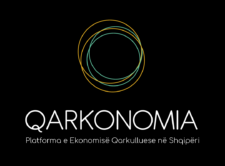The 7 pillars of circular economy
7 pillars of circular economy
Sustainable Procurement
This pillar emphasizes considering the environmental and social impacts associated with resource extraction and exploitation. The goal is to reduce waste and greenhouse gas emissions. Choosing suppliers based on ethical and environmental criteria is crucial for promoting sustainable practices throughout the supply chain.
Ecodesign
Ecodesign focuses on minimizing the environmental impact of products or services throughout their life cycle. This includes reducing plastic use, optimizing resource efficiency, and combating planned obsolescence to enhance reparability and recyclability.
Service Economy
The service economy promotes access to services rather than ownership of products. This approach extends product life cycles, reduces material consumption, and fosters job creation and community collaboration. Examples include bike-sharing programs and carpooling services.
Ekonomia e shërbimit
Ekonomia e shërbimit promovon aksesin në shërbime dhe jo pronësinë e produkteve. Kjo qasje zgjat ciklet e jetës së produktit, redukton konsumin e materialit dhe nxit krijimin e vendeve të punës dhe bashkëpunimin në komunitet. Shembujt përfshijnë programet e ndarjes/bashkëpërdorimit të biçikletave dhe shërbimet e bashkëpërdorimit të makinave (carpooling).
Responsible Consumption
Consumers, whether individuals or organizations, play a crucial role in the circular economy by making informed choices. It involves considering a product’s environmental and social impacts before purchase and opting for sustainable alternatives whenever possible.
Product Life Extension
Extending the life of products through repair, refurbishment, or reuse is essential for reducing waste and conserving resources. Embracing circular business models not only benefits the environment but also offers cost savings opportunities.
Recycling
Recycling plays a vital role in closing the loop of the circular economy by reusing raw materials from waste to create new products. However, it’s important to note that not all waste is currently recyclable, highlighting the need for improved recycling practices and innovations.
By embracing these seven pillars, individuals, businesses, and communities can actively contribute to a more sustainable and circular economy, benefiting both present and future generations.
Reference:
https://greenly.earth/en-gb/blog/company-guide/circular-economy-definition-and-principles
© 2025 Qarkonomi. Created with ❤ using WordPress and Kubio



